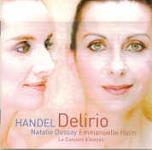This new recording of a pair of early Handel cantatas and a lengthy aria from the composer’s Aci, Galatea e Polifemo (an early serenata not to be confused with his later Acis and Galatea) brings together the remarkable French soprano Natalie Dessay and equally French and remarkable harpsichordist/conductor Emmanuelle Haïm. The former, perhaps better known as a bel canto soprano who is the world’s finest Zerbinetta, here enters the realm of Baroque music; since surgery for nodes on her vocal chords a while back she has been looking to leave the above-high-C realm and has developed a new richness at the lower end of her voice. The sound is still beautiful, the technique still astonishing–breath control, diminuendos, messa di voce, sense of rhythm, ease with even the fastest and trickiest fiorature, legato line–all come easily to Dessay. The CD’s finest 11 minutes are those devoted to the aria from Aci: a bird flying about reminds the singer of his own loneliness, and solo oboe and violin are prominent. The voice sits high and light; Dessay sings softly and with remarkable warmth, and her interplay with the two instrumentalists is truly great music making. She and Haïm think as one.
The two cantatas are concerned with love either lost or realized, and Dessay and Haïm imbue them with grace and virtuosity in equal parts. Dessay’s high notes no longer have the gleam they used to, but that gleam has been replaced with even greater sensitivity to the sculpting of the vocal line, and the listener never feels robbed. What the listener does miss in this recital is incisive diction and a true sense of drama; while the music is being well-served, a certain theatrical abandon is gone. Is this conscious? Were the two women looking for a mellow, chamber-like, understated approach? It’s hard to tell. This is not to deter fans of the singer, conductor, or composer, since the music probably has never sounded more ravishing–but I can’t help feeling that an unnecessary restraint has been placed on the whole undertaking for the sake of “art”.
































